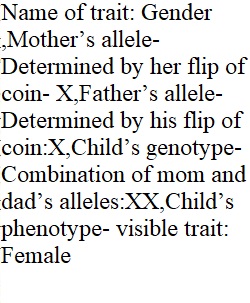


Q M1A1 Worksheet: Traits Why don’t all the daughters or sons from the same two parents look alike? The purpose of this activity is to illustrate the power of segregation of alleles and the independent assortment of genes to create new combinations of traits that make each human offspring unique. We will be producing hypothetical children to determine what traits they will express (phenotype) based on their inherited alleles (genotypes). For the purposes of this activity, you (the parent) are heterozygous for each of the following traits below. Each parent contributes one allele to the child. For example, if the trait is eye color and brown eye color is dominant (B) then each parent is Bb. You will pass on one of these alleles to your child (B or b). BB or Bb will result in a brown eyed child, while bb will result in a blue-eyed child. Rules: In this activity, you will act as both parents to your offspring. You will flip two coins to represent the two alleles contributed … one from each parent. Let one coin represent Mom. This will determine which of two potential alleles Mom will contribute. The second coin will represent Dad and will determine which of two potential alleles he will contribute. Tails is dominant (B) and heads is recessive (b). Record the alleles, genotype and phenotype for each trait. Fill in the chart below to keep track of the genotypes and phenotypes of your child. For fun, draw a picture of the face of your child. If you were to repeat this exercise would the next child look the same? 1. Gender Females have two X chromosomes (XX) and males have one X and one Y chromosome. The mother must always give an X chromosome to the child. The father can contribute an X or Y. Thus, the father alone should flip the coin. X is heads, Y is tails. Flip his coin to determine the sex of the child. Congratulations, you are having a _______! For the following questions see the “Rules” above to determine at each flip whether the dominant or recessive allele will be passed on to your child. The combination of the alleles, represented by letter (genotype) will determine the phenotype of the particular traits listed below. 2. Face Shape: Round (RR, Rr) Square (rr) 3. Chin cleft: Cleft present (CC, Cc) Cleft absent (cc) 4. Hair texture: Curly (CC) Wavy (Cc) Straight (cc) 5. Widow’s Peak: Peak present (WW, Ww) Peak absent (ww) 6. Eyebrow thickness: Thick, bushy (BB, Bb) Thin, fine (bb) 7. Dimples: Present (DD, Dd) absent (dd) 8. Nose size: Large (NN) medium (Nn) small (nn) 9. Earlobe Attachment: Unattached (EE, Ee) attached (ee) 10. Freckles: Freckles present (FF, Ff) freckles absent (ff)
View Related Questions